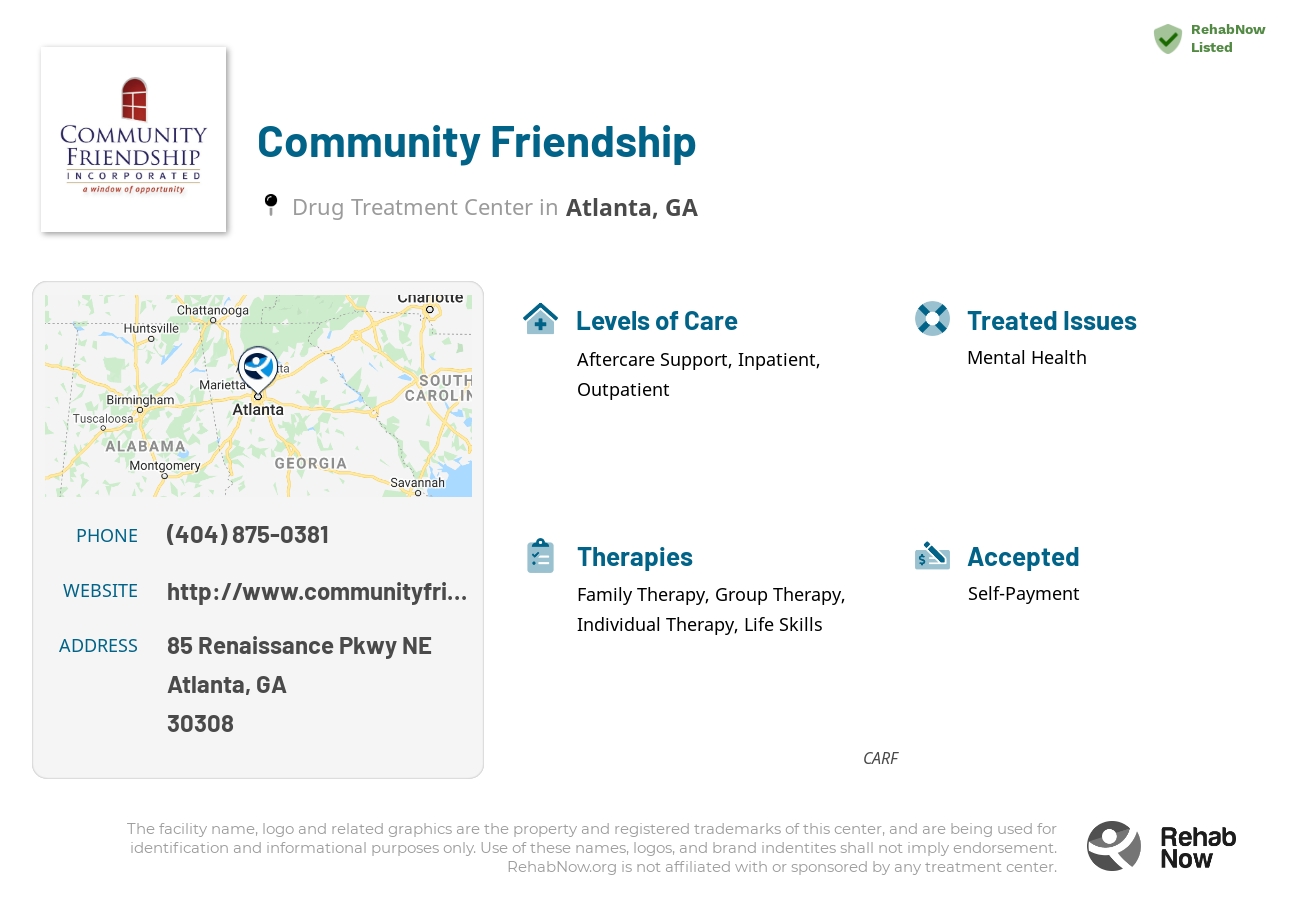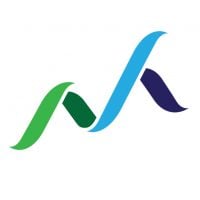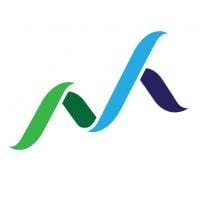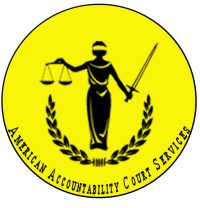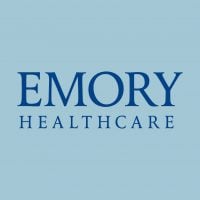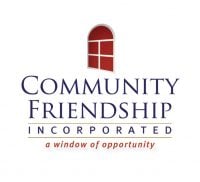
Community Friendship
Drug Rehab Center in Atlanta, Georgia
- Mental Health
Community Friendship is a non-profit organization in Atlanta that offers innovative and compassionate treatment and support for individuals with substance abuse and addiction issues, providing educational services, counseling, therapy, and linkage services, and is accredited by various organizations for demonstrating high-quality services.
About This Georgia Facility
Community Friendship is a non-profit organization based in Atlanta, Georgia that provides treatment and support for individuals with substance abuse and addiction issues. It is committed to providing innovative and comprehensive prevention, clinical, and recovery services with a high degree of respect and compassion for their clients. Through individualized treatment plans, the facility offers comprehensive therapeutic and supportive care for individuals suffering from addiction. Treatment focuses on developing coping skills and relapse prevention techniques that can help individuals find the way to a successful recovery.
Community Friendship's treatment program includes counseling and therapy services, as well as holistic care and activities designed to address the needs of individuals suffering from addiction and substance abuse. The program also provides educational services to clients, family members, and communities to help them understand addiction, with an emphasis on the importance of early intervention and support services. In addition, the facility also offers referral and linkage services to ensure that each client is connected with the right resources and support necessary for a successful recovery.
The organization is accredited by the Commission on Accreditation of Rehabilitation Facilities and has received licenses from the Georgia Department of Behavioral Health and Developmental Disabilities. Community Friendship also holds an accreditation from the Council on Accreditation and has been recognized for demonstrating high-quality services to clients in need of addiction recovery. The facility has receive awards from the Atlanta Association of Fundraising Professionals and the Safe Communities Coalition for its commitment to promoting a safe and healthy community for individuals affected by addiction.
Genders
Ages
Modality
Additional
Accreditations

CARF
The Commission on Accreditation of Rehabilitation Facilities (CARF) is a non-profit organization that specifically accredits rehab organizations. Founded in 1966, CARF's, mission is to help service providers like rehab facilities maintain high standards of care.
Conditions and Issues Treated
Levels of Care Offered at Community Friendship
This center offers a variety of custom treatment tailored to individual recovery. Currently available are Aftercare Support, Inpatient, Outpatient, with additional therapies available as listed below.
Inpatient treatment centers offer a safe, secure, and often medically supervised environment for drug or alcohol-addicted individuals. Many of these facilities are equipped to provide detoxification, treatment for co-occurring mental health disorders, and aftercare programs. The patient typically spends 28 to 30 days at the facility and will receive extensive drug counseling.
An outpatient treatment program is set up to help with alcohol or drug addiction or a co-occurring disorder. The patient must attend the facility for their therapy and other programs but can return home each night.
The frequency of mandatory attendance decreases after much of Community Friendship‘s program is complete.
Outpatient treatment is a recovery approach that allows recovering addicts to live at home while getting rehab for addiction
An outpatient can include day treatments which include attending group sessions one hour per week. A person living in an outpatient environment may be allowed the opportunity to work full time if they choose to and continue studies without interruption from drugs/alcohol.
Outpatient treatment is an option for people who want to maintain their careers and families. Outpatients live at home but attend treatment such as individual counseling, group counseling, or twelve-step meetings during the day.
Aftercare support is vital to the success of someone in drug or alcohol treatment. It involves assisting with entering a sober living home, getting career counseling or educational assistance and even getting the individual lined up with programs like AA and NA. This support helps recovering addicts readjust to normal day-to-day activities and maintain sobriety.
When a person is in drug or alcohol treatment, they have to increase their focus on themselves. They need to learn how to recognize the triggers that cause them to relapse and learn the habits that would benefit them if they were to be sober. This is all part of the growth in recovery, and aftercare is essential to that process.
Therapies & Programs
At Community Friendship , to learn from past mistakes and improve one’s situation, the recovering person meets individually with a therapist. The counselor or therapist will address addiction causes, triggers, mental issues, dual diagnosis, and aftercare plans during this time. This is a very intense and challenging process. Some clients find it easier to open up to someone other than family or friends who understand their struggles with addiction.
Family therapy is a crucial part of drug treatment and getting sober. It is one of the most effective ways to help addicts stay on the path to long-term sobriety. An addict’s family can play a vital part in helping them to avoid relapse. They can spot the warning signs and help them get back on track.
In group therapy, recovering addicts meet with a therapist and other people in recovery. Some groups are closed, meaning only people who share the same addiction or problem can attend. Others are open to anyone who wants to stop using drugs or drinking alcohol. Group therapy sessions typically focus on one topic each week or month so that recovering addicts can discuss issues they face daily.
Drug and alcohol addiction can lead to a breakdown in life skills. Learning certain life skills can help those who are struggling with addiction. Life skills training at Community Friendship in Atlanta, GA teaches patients skills such as time management, budgeting, and social abilities to improve their quality of life and prevent relapse.
An addict’s life skills are maladaptive, meaning they are counterproductive. An addict may have learned poor time management skills growing up, have a hard time budgeting money, or be socially awkward. An addict’s poor life skills can lead to relapse and the inability to achieve long-term sobriety. Life skills training teaches patients effective coping mechanisms, which can help them live a clean and sober life.
Payment Options Accepted
For specific insurance or payment methods please contact us.
Additional Details
Specifics, location, and helpful extra information.
Atlanta, Georgia 30308 Phone Number(404) 875-0381 Meta DetailsUpdated November 25, 2023
Staff Verified
Patient Reviews
There are no reviews yet. Be the first one to write one.
Atlanta, Georgia Addiction Information
Prescription opioid use has caused a large increase in the total amount of overdoses in Georgia. Almost 12% of the Georgia population uses illicit drugs each year, and slightly over 3.5% also abuses alcohol at the same time. This does not include those who binge-drink at least once a month, which includes 20% of all Georgians.
Addiction statistics for 2019 show that about 62% of people died from drug overdoses in Atlanta. Opioids were involved in 59.5% of those deaths. The community is plagued by the illegal drug trade, which contributes to crime and violence. In 2013, there were 9,570 admissions to substance abuse treatment programs in Atlanta. With patience and perseverance, you should be able to find the perfect treatment facility for your needs.
Treatment in Nearby Cities
- Conyers, GA (22.2 mi.)
- Alapaha, GA (178.2 mi.)
- Dacula, GA (31.8 mi.)
- Mcrae, GA (145.8 mi.)
- Norcross, GA (15.5 mi.)
Centers near Community Friendship
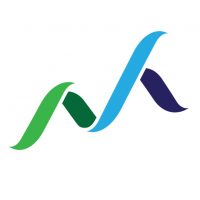

The facility name, logo and brand are the property and registered trademarks of Community Friendship, and are being used for identification and informational purposes only. Use of these names, logos and brands shall not imply endorsement. RehabNow.org is not affiliated with or sponsored by Community Friendship.


